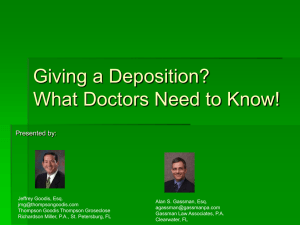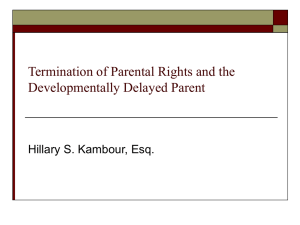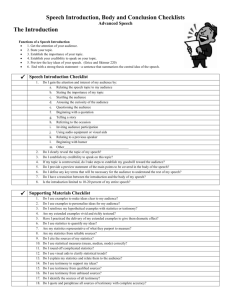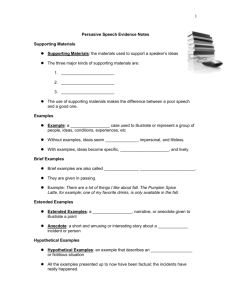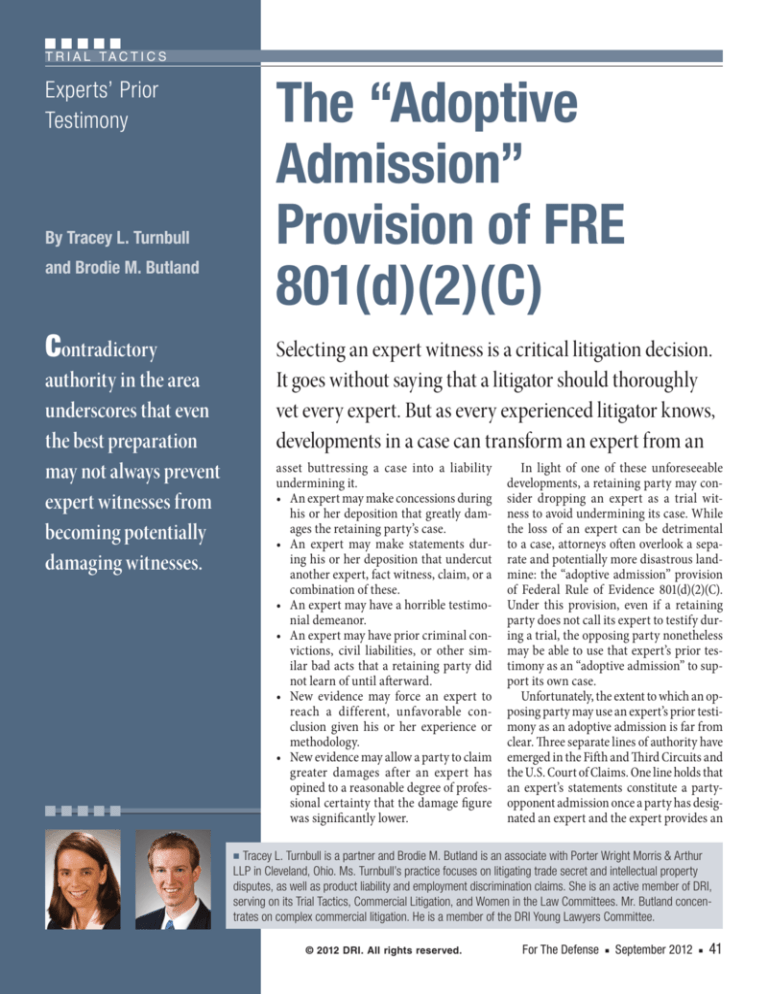
T r i a l Ta c t i c s
Experts’ Prior
Testimony
By Tracey L. Turnbull
and Brodie M. Butland
Contradictory
authority in the area
underscores that even
the best preparation
may not always prevent
expert witnesses from
becoming potentially
damaging witnesses.
The “Adoptive
Admission”
Provision of FRE
801(d)(2)(C)
Selecting an expert witness is a critical litigation decision.
It goes without saying that a litigator should thoroughly
vet every expert. But as every experienced litigator knows,
developments in a case can transform an expert from an
asset buttressing a case into a liability
undermining it.
• An expert may make concessions during
his or her deposition that greatly damages the retaining party’s case.
• An expert may make statements during his or her deposition that undercut
another expert, fact witness, claim, or a
combination of these.
• An expert may have a horrible testimonial demeanor.
• An expert may have prior criminal convictions, civil liabilities, or other similar bad acts that a retaining party did
not learn of until afterward.
• New evidence may force an expert to
reach a different, unfavorable conclusion given his or her experience or
methodology.
• New evidence may allow a party to claim
greater damages after an expert has
opined to a reasonable degree of professional certainty that the damage figure
was significantly lower.
In light of one of these unforeseeable
developments, a retaining party may consider dropping an expert as a trial witness to avoid undermining its case. While
the loss of an expert can be detrimental
to a case, attorneys often overlook a separate and potentially more disastrous landmine: the “adoptive admission” provision
of Federal Rule of Evidence 801(d)(2)(C).
Under this provision, even if a retaining
party does not call its expert to testify during a trial, the opposing party nonetheless
may be able to use that expert’s prior testimony as an “adoptive admission” to support its own case.
Unfortunately, the extent to which an opposing party may use an expert’s prior testimony as an adoptive admission is far from
clear. Three separate lines of authority have
emerged in the Fifth and Third Circuits and
the U.S. Court of Claims. One line holds that
an expert’s statements constitute a party-­
opponent admission once a party has designated an expert and the expert provides an
■ Tracey L. Turnbull is a partner and Brodie M. Butland is an associate with Porter Wright Morris & Arthur
LLP in Cleveland, Ohio. Ms. Turnbull’s practice focuses on litigating trade secret and intellectual property
disputes, as well as product liability and employment discrimination claims. She is an active member of DRI,
serving on its Trial Tactics, Commercial Litigation, and Women in the Law Committees. Mr. Butland concentrates on complex commercial litigation. He is a member of the DRI Young Lawyers Committee.
© 2012 DRI. All rights reserved.
For The Defense September 2012 41
■
■
T r i a l Ta c t i c s
opinion. Another line holds that an expert’s
prior testimony is never a party-­opponent
admission without direct evidence of an
agency relationship. The final line holds that
an expert’s prior testimony becomes a party-­
opponent admission only once the expert is
designated as a trial witness.
The inherently contradictory authority and the lack of a governing precedent
Under theCollins line
of cases, an expert is
presumed to speak for
the party that retained
the expert regardless
of whether the expert
testifies during a trial.
in most federal jurisdictions can create
a quandary when trying to decide how
to proceed with a potentially ineffective expert. The conservative approach
would involve designating the expert as
a potential trial witness in the event that
the expert becomes necessary during the
trial. This approach may be warranted
when a retaining party would prefer to
use other evidence to establish liability or
damages instead of its expert but that evidence is subject to pending admissibility
challenges. In other words, the retaining party needs the expert just in case the
court rules the other evidence inadmissible. Yet this precautionary approach may
allow the opposing party to read parts of
the expert’s deposition into the record as a
party-­opponent admission and undermine
other evidence of damages if the expert
ultimately becomes unnecessary.
This article assesses different strategies available to you when you either seek
(1) to prevent an opposing party to use
your party’s expert’s prior testimony as an
adoptive admission during a trial; or (2) to
use the testimony of an opposing party’s
expert as a party-­opponent admission during a trial. First, this article reviews Fed-
42 For The Defense September 2012
■
■
eral Rule of Evidence 801(d)(2)(C), which
attorneys and courts typically rely on to
deem expert deposition testimony a party-­
opponent admission. Second, this article
explains the three lines of authority that
courts follow in deciding whether prior
testimony of an expert not called to testify
during a trial can become evidence read
into the record as a party-­opponent admission. Third, this article suggests tactics that
you can use if you encounter these lines of
authority, or when a jurisdiction has not
adopted one yet.
the legal quagmire emerges three primary
lines of authority running the entire gamut
of approaches. Each of these approaches is
discussed below.
The Most Extreme Approach:
Collins v. Wayne Corp.
An early approach to the question of admissibility of an expert’s deposition against the
retaining party, generally credited as originating with Collins v. Wayne Corp., 621
F.2d 777 (5th Cir. 1980), is that an expert’s
statements are attributable to a party as an
admission under Fed. R. Evid. 801(d)(2)
(C) once a party has designated an expert
Adoptive Admissions:
as such and the expert has rendered some
FRE 801(d)(2)(C)
Federal Rule of Evidence 801(d)(2) states form of opinion. It is, therefore, irrelevant
that admissions by a party-­opponent are to these courts whether or not the expert
not hearsay. Courts holding that at least in will testify during a trial.
In Collins, a party retained an expert
some circumstances prior testimony by an
expert constitutes a party-­opponent admis- to investigate and analyze a bus accident
sion rely on the “adoptive admission” pro- and report on the bus speed and its impact
vision in subsection (C) of the rule, which with a tractor-­trailer. Before the trial, the
states: “A statement is not hearsay if… [t]he defendant sought to exclude the expert’s
statement is offered against a party and deposition because he was merely a “conis… a statement by a person authorized sultant.” Id. at 780. The Fifth Circuit held
by the party to make a statement concern- that deposition testimony of an expert eming the subject[.]” Fed. R. Evid. 801(d)(2) ployed by a bus manufacturer to investigate
(C). To determine whether the statement an accident was an admission under Fedwas authorized by the party, a court must eral Rule of Evidence 801(d)(2)(C) because
consider the contents of the statements, the expert witness was an agent of the debut they cannot alone establish authoriza- fendant, who employed the expert to investion. Fed. R. Evid. 801, Advisory Commit- tigate and analyze the bus accident. Id. at
782. The court found that in providing his
tee Notes (1997).
According to the committee notes, sub- deposition, the expert performed the funcsection (C) was phrased broadly to encom- tion that the manufacturer had employed
pass statements to third persons and him to perform. Specifically, the expert’s
statements by an agent to the principal— investigation report and deposition testiit does not apply solely to statements made mony explaining his analysis and investito third parties. Id. However, the Advisory gation was an admission of the defendant.
Committee did not indicate whether, or to Id. The district court erred in failing to adwhat extent, a retained expert’s opinions mit the testimony as a party-­opponent adand prior testimony constituted a party-­ mission, though ultimately the Fifth Circuit
opponent admission as an authorized state- found the error harmless. Id. at 782–83.
Several courts not within the Fifth Cirment by a party.
cuit have adopted the Collins rule. Long v.
Fairbank Farms, Inc., No. 1:09-cv-592, 2011
Three’s a Crowd: The Collins, Kirk,
WL 2516378 (D. Me. May 31, 2011); Dean
and Glendale Lines of Authority
In discussing cases addressing the use v. Watson, No. 93-C-1846, 1996 WL 88861
of an expert’s deposition testimony as a (N.D. Ill. Feb. 28, 1996). See also BNSF Ry.
party-­opponent admission, Glendale Fed. Co. v. Lafarge Sw., Inc., No. 06-1076, 2009
Bank, FSB v. United States, 39 Fed. Cl. 422, WL 4279850, at *4 n.3 (D.N.M. Feb. 3, 2009)
423 (1997), aptly observed that “[t]his area (finding that parties adopted expert’s opinof law is murky at best with several diver- ions because they designated the expert as
gent streams and many highly fact specific such after knowing his opinions). Courts
eddies making up the case law.” But from have applied Collins to the trial setting and
to pretrial motions practice. In Long, cross-­
claimants sought summary judgment on
indemnification and other related claims.
2011 WL 2516378, at *1. In their briefing,
third-party plaintiffs cited the deposition
testimony of an expert retained by thirdparty defendants and argued that it constituted a party-­opponent admission under
Federal Rule of Evidence 801(d)(2)(C). The
third-party defendants responded that the
expert was hired “to fully explore and
better understand the allegations against
it,” the defendants “always expected [the
expert] to testify impartially,” the expert
was never subject to defendants’ control
nor authorized to make admissions for the
defendants, and the defendants had not yet
determined whether they would call the
expert to testify during the trial. Id. at *9.
“Even taking all of these assertions at face
value,” the court held that the expert “was
authorized by [the third-party defendants]
to make a statement concerning the subject matter about which he testified,” and
his statements constituted party-­opponent
admissions under Federal Rule of Evidence 801(d)(2)(C). Id. at *10. Among other
authorities, Long cited Collins for support.
Id. The court did not find it persuasive that
the expert was not subject to control by
the third-party defendants, as that would,
at most, have indicated that there was not
an agency relationship sufficient to find a
party-­opponent admission under Federal
Rule of Evidence 801(d)(2)(D). Id.
Under the Collins line of cases, an expert
is presumed to speak for the party that
retained the expert regardless of whether
the expert testifies during a trial. Accordingly, Collins and its progeny allow an
expert’s deposition to be used against
the retaining party under Federal Rule
of Evidence 801(d)(2)(C) with very little
restriction.
The “Independent Expert”:
Kirk and Soitec
On the opposite end of the spectrum,
courts find that an expert’s deposition cannot be used against the retaining party as
an admission because the expert is considered “independent.” This view is exemplified by the Third Circuit’s decision in Kirk
v. Raymark Indus., Inc., 61 F.3d 147 (3d Cir.
1995), in which the court stated that the
“agency theory” set forth in Collins misses
“the entire premise of calling expert witnesses.” Id. at 164. As the court explained,
despite the fact that one party retained
and paid for the services of an expert
witness, expert witnesses are supposed
to testify impartially in the sphere of
their expertise. Thus, one can call an
expert witness even if one disagrees with
the testimony of the expert. Rule 801(d)
(2)(C) requires that the declarant be
an agent of the party-­opponent against
whom the admission is offered, and this
precludes the admission of the prior testimony of an expert witness where, as
normally will be the case, the expert has
not agreed to be subject to the client’s
control in giving his or her testimony.
Since an expert witness is not subject to
the control of the party opponent with
respect to consultation and testimony he
or she is hired to give, the expert witness
cannot be deemed an agent.
Id. (citations omitted). Applying this analysis, the Kirk court noted, “because an expert
witness is charged with the duty of giving
his or her expert opinion regarding the matter before the court, we fail to comprehend
how an expert witness, who is not an agent
of the party who called him, can be authorized to make an admission for that party.”
Id. (emphasis in original). Based on this reasoning, Kirk held that an expert’s deposition
in a prior, unrelated case could not be used
to impeach a party in a pending case. Id.
Though Kirk involved an attempt to use
expert testimony from prior, different litigation as an admission in a present case,
Third Circuit courts have applied Kirk with
equal force to experts retained in the same
litigation. See St. Paul Fire and Marine
Ins. Co. v. Nolen Group, Inc., No. 02-8601,
2007 WL 2571524, at *7 n.6 (E.D. Pa. Aug.
31, 2007) (“Although [one case] distinguished Kirk on the basis that Kirk dealt
with expert testimony provided in a prior
litigation, rather than in the same litigation, the distinction is unavailing. The critical distinction is whether an expert is, on
the record, an agent of the party.”); Pfizer,
Inc. v. Ranbaxy Labs., Ltd., No. 03-209,
2005 WL 2296613, at *2 (D. Del. Sept. 20,
2005) (“[T]he Court does not read Kirk to
be limited to circumstances involving the
prior trial testimony of a witness.”); Bostick
v. ITT Hartford Group, 82 F. Supp. 2d 376,
379 (E.D. Pa. 2000) (same).
The extension of Kirk to expert deposition testimony in the same litigation is
exemplified by Soitec, SA v. Silicon Genesis Corp., No. 99-10826, 2002 WL 34453284
(D. Mass. Feb. 25, 2002). In that case, an
expert was designated as a trial witness
of the plaintiff but later withdrawn. The
defendant then attempted to introduce
his prior deposition testimony as a party-­
opponent admission under Federal Rule
of Civil Procedure 801(d)(2)(C). The court
expressed its agreement with Kirk that
in the relationship between a lawyer and
expert, the “expert is more like an independent contractor offering his own opinion and is not ‘controlled’ by the party who
employs him.” Id. at *1. As a result,
[t]he adoptive admission theory falters
because it cannot be said that [the plaintiff ’s] actions represent acquiescence
in or adoption of every aspect of [the
expert’s] testimony, and particularly
the comment on which [the defendant’
wants to rely, which was made in the
course of the deposition…. [C]ounsel for
the employing party is under no obligation to state ‘we agree with that statement,’ or ‘we disagree with that one.’ Id.
The court rejected the agency theory of
admission of Federal Rule of Evidence
801(d)(2)(D) on the same grounds. Id.
Similarly, a bankruptcy court, though
acknowledging Collins, also followed Kirk’s
reasoning and held that the deposition
testimony of an expert identified by the
debtor, but not called during a trial, was
inadmissible hearsay evidence. In re Hidden Lakes Ltd. P’ship, 247 B.R. 722, 724
(S.D. Ohio 2000). Citing Kirk, the court
noted that “expert witnesses are supposed
to testify impartially in the sphere of their
expertise,” and nothing suggested that the
debtor had actual control over the testimony or conclusions of the expert. Id. The
court thus precluded the non-­testifying
expert’s deposition testimony. See also
Pfizer, 2005 WL 2296613, at *2 (finding
no adoptive admission because the plaintiff had not provided “independent proof
of the existence of [the expert’s] authority
to speak for [the defendant]”).
A handful of courts have also employed
Kirk’s reasoning when an expert had testified and been cross-­examined but the
opposing party wished separately to admit
the expert’s prior deposition testimony as
For The Defense September 2012 43
■
■
T r i a l Ta c t i c s
a party-­opponent admission. These cases
rejected Collins and found that the expert’s
testimony did not constitute an adoptive
admission. They also noted that the proper
time to address prior deposition testimony
was during the expert’s cross-­examination.
Smith v. United States, No. 3:95-cv-445,
2012 WL 1453570, at *31–32 (S.D. Ohio Apr.
26, 2012) (rejecting Collins and adopting
Under theKirk analysis,
an expert’s prior testimony
is not deemed to be an
adoptive admission without
independent proof that a
retaining party has control
over the testimony or
conclusions of an expert.
Kirk to preclude testimony); Koch v. Koch
Indus., Inc., 37 F. Supp. 2d 1231, 1244–
45 (D. Kan. 1998), rev’d in part on other
grounds, 203 F.3d 1202 (10th Cir. 2000).
Thus, under the Kirk analysis, an
expert’s prior testimony is not deemed to
be an adoptive admission without independent proof that a retaining party has control over the testimony or conclusions of
an expert. This is even true for experts who
are designated as trial witnesses but subsequently withdrawn.
Trial as the “Critical Juncture”: Glendale
The third approach, originating with Glendale Fed. Bank, FSB v. United States, 39 Fed.
Cl. 422 (1997), attempts to create a middle ground between Collins and Kirk. On
the one hand, Glendale agreed with Kirk’s
premise that an expert “is expected to give
his own honest, independent opinion,”
and that “[h]e is not the sponsoring party’s agent at any time merely because he is
retained as its expert witness.” Id. at 423.
Glendale noted that deeming a deposition
to be the point at which an expert’s views
become attributable to the retaining party
44 For The Defense September 2012
■
■
“would unduly intrude on a party’s ability
to control its own case,” as well as “inhibit a
party’s attempt to fully explore and understand its own case.” Id. at 424. On the
other hand, Glendale rejected Kirk’s premise that to constitute an adoptive admission under Federal Rule of Evidence 801(d)
(2)(C), the expert must be an agent of the
party. Rather, Glendale noted that Federal
Rule of Evidence 801(d)(2)(C), which concerns “person[s] authorized to speak,” is
separate and distinct from Federal Rule
of Evidence 801(d)(2)(D), which concerns
agents. Id.
The court ultimately determined that
an expert’s deposition testimony may be
an adoptive admission once the expert was
designated as a trial witness, since by that
point the court “may assume that those
experts who have not been withdrawn are
those whose testimony reflects the position
of the party who retains them.” Id. at 424–
25. Importantly, Glendale was not based
on a “retroactive[] finding [of] agency or
control at the time of a particular deposition”; rather, Glendale’s rule was based
solely on the perception that “[t]he beginning of trial is a critical juncture” when it
was “fair to tie the party to the statements
of its experts.” Id. at 425. The court, therefore, permitted the plaintiff to use depositions of two of the defendant’s experts as
party-­opponent admissions because those
experts were not withdrawn before the
trial. Id. The court, however, prohibited the
use of a third expert’s deposition as a party-­
opponent admission because he had been
withdrawn before the trial. Id.
Numerous courts have found Glendale’s reasoning persuasive and allowed
an expert’s prior deposition testimony as
an adoptive admission if the expert was
designated as a trial witness. Cadlerock
Joint Venture, L.P. v. Royal Indem. Co., No.
02-16012, 2012 WL 511531, at *1, 3 (N.D.
Ohio Feb. 15, 2012) (excluding the expert’s
deposition testimony because the expert
was withdrawn before the trial); Mann v.
Lincoln Elec. Co., No. 1:06-cv-17288, 2010
U.S. Dist. LEXIS 43824, at *3–6 (N.D. Ohio
May 5, 2010) (same); Minebea Co., Ltd. v.
Papst, No. 97-0590, 2005 WL 6271045, at *1
(D.D.C. Aug. 2, 2005) (same). See also Durham v. Cty. of Maui, 804 F. Supp. 2d 1068,
1070 (D. Haw. 2011) (finding Glendale “persuasive” but declining to “craft a particu-
lar rule drawing a clear line between when
expert opinions qualify as statements of
party opponents”); In re Hanford Nuclear
Reservation Litig., 534 F.3d 986, 1016 (9th
Cir. 2008) (citing Glendale and holding
that an expert’s testimony from the “first
bellwether trial” in a multistage trial was
admissible as an adoptive admission in a
subsequent trial stage).
The Glendale line of authority seeks to
compromise the two extremes exemplified by Collins and Kirk by holding that
an expert’s prior testimony only becomes
an adoptive admission when the expert
is designated as a trial witness. The testimony of an expert withdrawn prior to trial
will not be admissible against the retaining party under Federal Rule of Evidence
801(d)(2)(C).
Navigating Uncertainty: Using
an Opponent’s Expert and
Protecting Your Own
Not having a uniform standard for admitting an expert’s prior deposition testimony
as a party-­opponent admission complicates
understanding the circumstances under
which courts may admit an expert’s prior
deposition testimony as an adoptive admission. However, we have some general suggestions for approaching the issue when you
seek to protect an expert’s deposition testimony, or, conversely, to use an opponent’s.
Protecting Your Own Expert
When a party’s expert is a potential liability
the party should ensure that it does not
open the door to an adoptive admission by
unnecessarily designating the expert as a
trial witness. Practitioners in the Fifth and
Third Circuits have a reasonable expectation of how courts will analyze the issue:
Fifth Circuit courts will likely follow Collins, and Third Circuit courts will likely follow Kirk. In these jurisdictions, it appears
that a party will not suffer a meaningful
disadvantage by designating the expert as
a trial witness.
As for Glendale courts, you may face a
fundamental strategic difficulty. It is a relatively easy decision to abandon an expert
who significantly undercuts a party’s case
during a deposition or whose opinion no
longer appears to be valid—and under Glendale, the opposing party will not be able to
use that expert’s deposition testimony as an
adoptive admission. The difficulty arises,
however, when you can potentially establish a significant point through other evidence, including another potential expert,
but your opponent likely will challenge that
evidence. In those circumstances, you justifiably would not want to abandon an expert without confirming the admissibility
of the other evidence. However, in practice,
courts often cannot resolve evidentiary admissibility issues before the parties must
disclose their trial witnesses.
In such circumstances, you could file a
motion before the deadline for identifying trial witnesses seeking an expedited
determination of outstanding admissibility
issues, or, alternatively, for permission to
withdraw the expert upon the admissibility
ruling without rendering the expert’s prior
deposition testimony a party-­opponent
admission. The Glendale rule was founded
on a presumption “that those experts who
have not been withdrawn are those whose
testimony reflects the position of the party
who retains them.” Glendale, 39 Fed. Cl.
at 424. That presumption, however, arguably is not appropriate when a party designates an expert as a witness only because of
pending admissibility issues for other evidence, and the party cannot establish its
litigation position without judicial guidance. Without a ruling, you must choose
the lesser of two evils based on the best
available information.
Additionally, even if you identify an
expert as a trial witness but later withdraw
that expert, you still have means of mitigating or eliminating the potential damage
from the prior testimony. First, all deposition testimony is subject to the rule of
completeness in Federal Rule of Civil Procedure 32(a)(6) and Federal Rule of Evidence 106, which provide that when a party
introduces part of a deposition as evidence,
an adverse party may require the offering party to introduce at the same time
any other portion of the deposition that
in fairness should be considered with that
part. Thus, if an opposing party designates
for the record an expert’s testimony as an
adoptive admission, you could mitigate
that testimony by calling for counter designations to ensure a fair evaluation of the
admissions cited by the party opponent.
Second, you should question whether the
testimony actually constitutes an “admis-
sion.” In In re Welding Fumes Prods. Liability Litig., No. 1:03-cv-17000, 2010 WL
7699456 (N.D. Ohio June 4, 2010), the court
found that an expert’s prior testimony
“did not make a clear, admissible admission.” Id. at *31. Further, the court noted
that if the court admitted the deposition
statement as evidence, “it would have to
be accompanied by [the expert’s] explanation, as well[,]” and the combined testimony “would be unduly confusing to a
jury, carry very little probative value to the
defendants’ case, and, in the end, carry no
clear ‘admission.’” The court thus refused
to admit the expert’s previous deposition
testimony. Id. at *32. Depending on the
nature of the testimony the opposing party
seeks to admit, you may move to preclude
the testimony because it does not constitute an “admission.” This would especially
hold true in cases where subsequent evidence undermined an expert’s conclusions.
Many of these strategies also apply to
jurisdictions that have not considered
whether and when an expert’s prior testimony constitutes an adoptive admission.
If a jurisdiction has not yet considered the
issue, you preemptively could move to preclude the expert’s deposition testimony
as a party-­opponent admission, arguing
that a court should adopt Kirk. Should a
court have the inclination to adopt Glendale, you alternatively could seek an expedited determination of the admissibility of
evidence, or permission to withdraw the
expert when the court rules on admissibility, as discussed above. As with the Glendale preemptive motion, you should file
this motion well in advance of the trial witness disclosure deadlines.
If a court rejects a preemptive motion
or declines to provide an expedited admissibility ruling, then you will have to make
the best decision possible based on the circumstances. Sometimes not designating
an expert as a trial witness may be the best
strategic decision under the circumstances.
Other times, you may need to designate
an expert as a trial witness in case a court
refuses to admit other evidence as inadmissible. In those cases, you will have to brief
the issue. If a court adopts Glendale or Collins, you should take all necessary steps to
preserve the issue for an appeal, and then
try to exclude the proposed deposition
testimony as not truly an “admission” or
mitigate the damage through counter designations under the rule of completeness.
Using an Opponent’s Expert
The strategy differs significantly when you
contemplate using an opponent’s expert
testimony as an adoptive admission. Prior
testimony of expert witnesses generally
seems admissible as an adoptive admission
in Collins jurisdictions. For Glendale jurisdictions, your approach will depend on the
goal. If you want to encourage the opposing side to strike its expert altogether, then
you may want to raise the adoptive admission issue before the parties must designate trial witnesses. In contrast, if you
seek to ensure that a court will have adoptive admissions read into the record, then
you should not raise the use of an expert’s
prior testimony as an adoptive admission
until after an opponent has designated the
expert as a trial witness.
The same applies to jurisdictions that
have not yet adopted an approach. If your
goal is to gain adoptive admissions for a
trial, you should delay raising using an
expert’s prior testimony until after an
opponent has designated the expert as a
trial witness. Once an opponent has designated the expert as a trial witness, you may
use the expert’s prior testimony as an adoptive admission if the court adopts either
Collins or Glendale.
Kirk and its progeny pose the most difficulty when you want to use the testimony
of an opposing party’s expert because they
support precluding litigants from using
the testimony of independent experts as
adoptive admissions. That said, you still
can use the prior testimony of the opposing party’s expert as an adoptive admission
if the opposing party controls the expert’s
opinion or testimony. While this typically
will not apply to third-party experts, it
may apply to in-house experts or to other
experts who have an agency or employment
relationship with an opposing party. Thus,
even in a Kirk jurisdiction, you may have
grounds for admitting an expert’s prior testimony under certain circumstances.
Conclusion
Even the best preparation does not always
prevent expert witnesses from becoming
potentially damaging witnesses. When
Expert Testimony, continued on page 85
For The Defense September 2012 45
■
■
Expert Testimony, from page 45
ney sometimes may have to designate that
expert as a potential trial witness even if
the attorney probably will not call him or
her to testify during a trial. In jurisdictions
allowing adoptive admissions, this tactic could mean that an opponent may use
the expert’s prior testimony as an adoptive
admission against the attorney’s party. You
should remember that some jurisdictions
permit this, keep in mind the ones that
do, and understand the grounds for using
an expert’s prior testimony as an adoptive admission. You should also under-
stand the three lines of authority on prior
expert testimony as an adoptive admission to identify strengths and weaknesses
of each persuasively in jurisdictions without governing rules so that you can obtain
the most favorable result.
For The Defense September 2012 85
■
■

